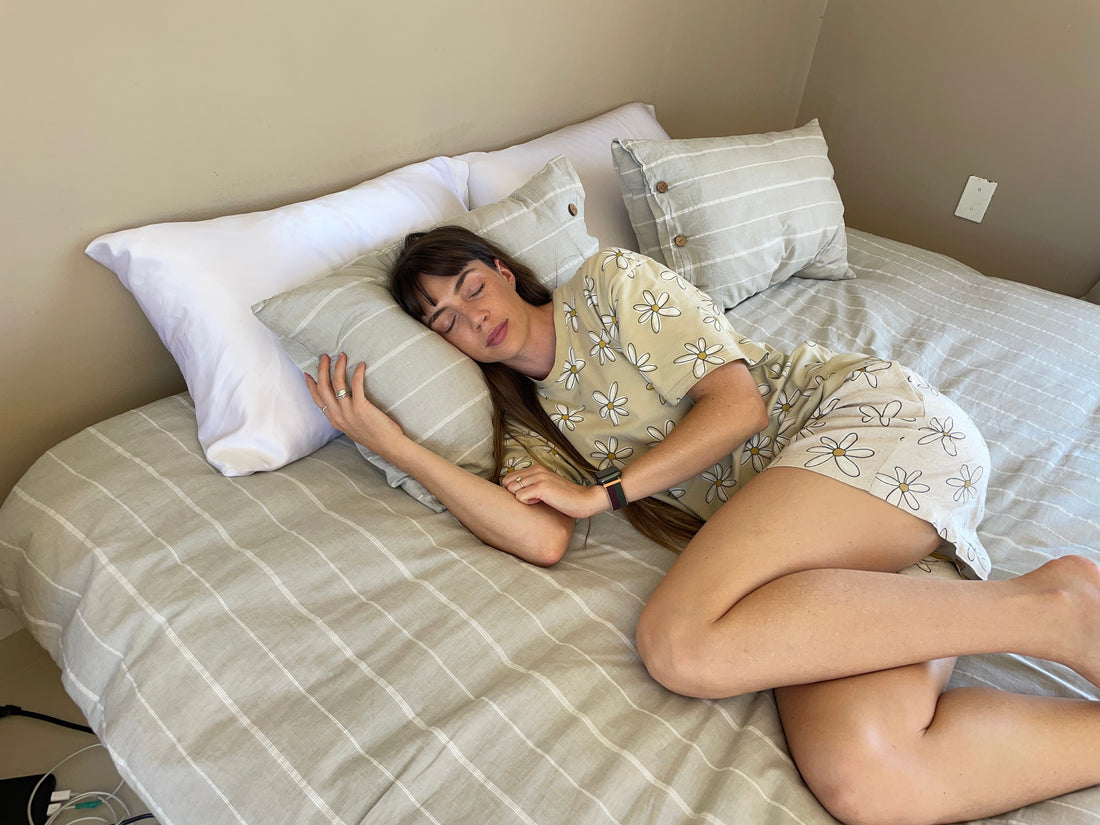
The 4 Stages of Sleep: Why They Matter & How to Optimise Your Rest
Share
When it comes to sleep, we tend to think in terms of hours, like “Did I get my 8 hours?” but what really matters is the quality of those hours. Sleep isn’t just a single state of rest, it’s a complex cycle that moves through four distinct stages, each playing an important role in recovery, brain function, and overall health. If your sleep cycle is disrupted, it doesn’t matter how long you’re in bed, you’ll still wake up feeling sluggish, sore, and mentally foggy.
So, what are these stages, and why are they important?
Our sleep cycle repeats in roughly 90-minute intervals throughout the night. Each cycle consists of four stages, three classified as non-REM sleep (NREM) and the final stage as REM sleep (rapid eye movement). Here’s what happens in each one:
The 4 Stages of Sleep:
Stage 1: The Transition into Sleep (NREM 1)
- What happens?
This is the lightest stage of sleep. You're hovering between wakefulness and unconsciousness. Your heart rate and breathing slow down slightly, muscles begin to relax, and brain wave activity shifts from wakefulness (beta waves) to slower alpha and theta waves.
- Why does it matter?
Stage 1 is brief, lasting just 1–5 minutes, but it’s needed for easing your body into deeper sleep. If you wake up frequently during this stage, you’ll struggle to enter the restorative phases that follow.
Stage 2: Light Sleep (NREM 2)
- What happens?
Brain waves continue to slow, and the body begins to prepare for deep sleep. Your core temperature drops, eye movement stops, and your brain produces sleep spindles which are bursts of rapid brain activity believed to be important for memory consolidation and learning.
- Why does it matter?
While this is still considered "light" sleep, it makes up about 50% of your total sleep time and plays a key role in cognitive processing. If you don’t get enough of it, you may experience memory issues, trouble concentrating, and a general sense of feeling “off.”
Stage 3: Deep Sleep (NREM 3, aka Slow-Wave Sleep)
- What happens?
This is where real recovery begins. Brain waves slow to delta waves, the body releases human growth hormone (HGH) for muscle repair, and the immune system strengthens. Blood pressure drops, muscles relax completely, and the body enters a state of deep physiological repair.
- Why does it matter?
Without enough deep sleep, recovery takes a hit—muscle soreness lingers, inflammation increases, and the immune system weakens. This stage also supports brain detoxification through the glymphatic system, which clears out metabolic waste.
Stage 4: REM Sleep (Dreaming & Brain Restoration)
- What happens?
Brain activity spikes, heart rate and breathing become irregular, and vivid dreams occur. This stage is critical for emotional regulation, memory consolidation, and creativity. Your body experiences muscle atonia (temporary paralysis) to prevent you from acting out dreams.
- Why does it matter?
REM sleep is like a nightly therapy session for your brain. It helps process emotions, solidify learning, and support cognitive function. If you’re skipping REM (which is common when sleep is disrupted), you’ll likely experience mood swings, anxiety, and difficulty focusing.
How Modern Life Disrupts Your Sleep Cycle
We all know that getting quality sleep is easier said than done. Here’s how some common habits are wrecking your ability to move through all four sleep stages properly:
1. Stress & Anxiety
When your nervous system is in a state of heightened alertness, falling into deep sleep becomes nearly impossible. Chronic stress leads to an overproduction of cortisol, which suppresses slow-wave sleep (the stage where muscle recovery and immune support happen).
2. Screens Before Bed (Blue Light Exposure)
Your phone, TV, and laptop emit blue light, which suppresses melatonin production—the hormone responsible for making you feel sleepy. This tricks your brain into thinking it’s still daytime, delaying the onset of deep sleep and reducing REM cycles.
3. Alcohol & Sleep: A False Sense of “Rest”
Many people think alcohol helps them sleep because it makes them drowsy. But alcohol actually fragments sleep—you fall asleep faster, but you wake up frequently, get less deep sleep, and miss out on REM. This leaves you feeling groggy and unrested.
4. Cannabis & Sleep: Short-Term Gain, Long-Term Disruption
While cannabis can make falling asleep easier, long-term use has been linked to reduced REM sleep—meaning less dreaming, poorer memory consolidation, and a higher likelihood of feeling mentally sluggish the next day.
How Rest & Recover Supports Your Sleep Quality
Improving sleep isn’t just about avoiding the bad stuff, it’s also about giving your body the right nutrients to support each sleep stage. That’s exactly why we created Rest & Recover, a nighttime drink designed to optimize your sleep cycle. Here’s how our key ingredients help:
✔ Magnesium Glycinate & Zinc Bisglycinate – Support deep sleep by calming the nervous system and reducing nighttime wakeups.
✔ GABA & Theanine – Help lower stress and promote relaxation, making it easier to transition into deep sleep.
✔ Ashwagandha & Chamomile Extracts – Adaptogenic herbs that help balance cortisol levels and support overall sleep quality.
✔ Reishi Mushroom Extract – Supports the immune system and enhances deep sleep quality.
✔ BCAAs (Leucine, Isoleucine, Valine) & Glutamine – Assist in muscle recovery and repair during slow-wave sleep.
✔ Vitamin B6 & Ascorbic Acid (Vitamin C) – Essential for neurotransmitter production, helping regulate sleep patterns.
Sleep isn’t just about quantity, it’s about getting the right balance of all four stages. If you’re constantly waking up feeling tired, chances are your sleep cycle is being disrupted. Stress, screens, alcohol, and poor sleep hygiene can all take a toll, but the good news is that you can fix it by making a few simple changes and supporting your body with the right nutrients.
